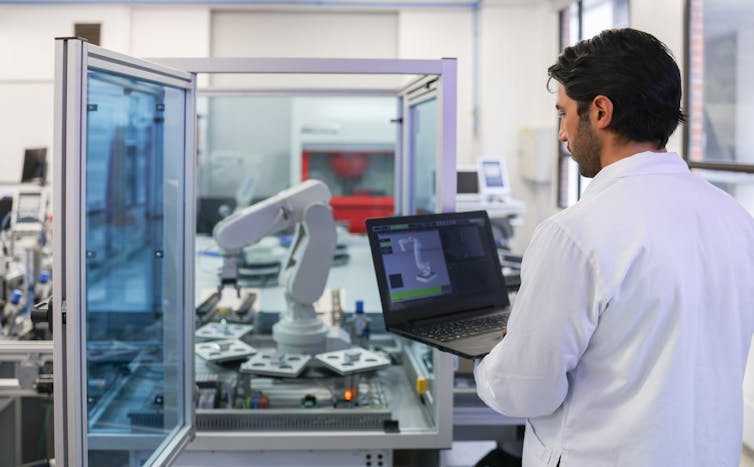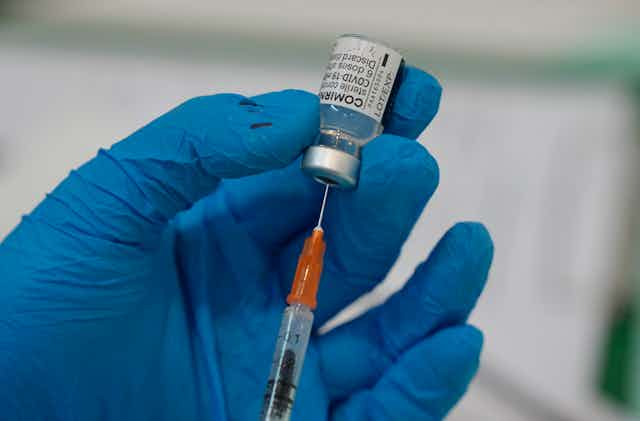The battle to keep the government open may feel just like the crisis of the day. But these fights pose immediate and long-term risks for the U.S.
The federal government spends tens of billions of dollars every year to support fundamental scientific research that is mostly conducted at universities. For instance, the basic discoveries that made the COVID-19 vaccine possible stretch back to the early 1960s. Such research investments contribute to the health, wealth and well-being of society, support jobs and regional economies and are vital to the U.S. economy and national security.
If Congress can’t reach an agreement, then a temporary government shutdown could happen on Jan. 19, 2024. If lawmakers miss a second Feb. 2 deadline, then automatic budget cuts will hit future research hard.
Even if lawmakers avoid a shutdown and pass a budget, America’s future competitiveness could suffer because federal research investments are on track to be billions of dollars below targets Congress set for themselves less than two years ago.
I am a sociologist who studies how research universities contribute to the public good. I’m also the executive director of the Institute for Research on Innovation and Science, a national university consortium whose members share data that help us understand, explain and work to amplify those benefits.
Our data shows how endangering basic research harms communities across the U.S. and can limit innovative companies’ access to the skilled employees they need to succeed.
A promised investment
Less than two years ago, in August 2022, university researchers like me had reason to celebrate.
Congress had just passed the bipartisan CHIPS and Science Act. The “science” part of the law promised one of the biggest federal investments in the National Science Foundation – America’s premier basic science research agency – in its 74-year history.
The CHIPS act authorized US$81 billion for the agency, promised to double its budget by 2027 and directed it to “address societal, national, and geostrategic challenges for the benefit of all Americans” by investing in research.
But there was one very big snag. The money still has to be appropriated by Congress every year. Lawmakers haven’t been good at doing that recently. The government is again poised to shut down. As lawmakers struggle to keep the lights on, fundamental research is likely to be a casualty of political dysfunction. The budget proposals released so far fall $5 billion to $7.5 billion short of what the CHIPS act called for in fiscal year 2024. Deal or no deal, science is on the chopping block in Washington.

Research’s critical impact
That’s bad because fundamental research matters in more ways than you might expect.
Lagging research investment will hurt U.S. leadership in critical technologies like artificial intelligence, advanced communications, clean energy and biotechnology. Less support means less new research work gets done, fewer new researchers are trained and important new discoveries are made elsewhere.
But disrupting federal research funding also directly affects people’s jobs, lives and the economy.
Businesses nationwide thrive by selling the goods and services – everything from pipettes and biological specimens to notebooks and plane tickets – that are necessary for research. Those vendors include high-tech startups, manufacturers, contractors and even Main Street businesses like your local hardware store. They employ your neighbors and friends and contribute to the economic health of your hometown and the nation.
Nearly a third of the $10 billion in federal research funds that 26 of the universities in our consortium used in 2022 directly supported U.S. employers, including:
- A Detroit welding shop that sells gasses many labs use in experiments funded by the National Institutes of Health, National Science Foundation, Department of Defense and Department of Energy.
- A Dallas-based construction company that is building an advanced vaccine and drug development facility paid for by the Department of Health and Human Services.
- More than a dozen Utah businesses, including surveyors, engineers and construction and trucking companies, working on a Department of Energy project to develop breakthroughs in geothermal energy.
When Congress’ problems endanger basic research, they also damage businesses like these and people you might not usually associate with academic science and engineering. Construction and manufacturing companies earn more than $2 billion each year from federally funded research done by our consortium’s members.
Jobs and innovation
Disrupting or decreasing research funding also slows the flow of STEM – science, technology, engineering and math – talent from universities to American businesses. Highly trained people are essential to corporate innovation and to U.S. leadership in key fields, like AI, where companies depend on hiring to secure research expertise.
In 2022, federal research grants paid wages for about 122,500 people at universities that shared data with my institute. More than half of them were students or trainees. Our data shows that they go on to many types of jobs, but are particularly important for leading tech companies like Google, Amazon, Apple, Facebook and Intel.
More comprehensive numbers don’t exist, but that same data lets me estimate that over 300,000 people who worked at U.S. universities in 2022 were paid by federal research funds. Threats to federal research investments put academic jobs at risk. They also hurt private-sector innovation because even the most successful companies need to hire people with expert research skills. Most people learn those skills by working on university research projects, and most of those projects are federally funded.
High stakes
The last shutdown was the longest in 40 years, but even short delays in research funding have big negative effects on the scientific workforce and lead expert researchers to look outside the U.S. for jobs. Temporary cuts to research funding hurt too because they reduce high-tech entrepreneurship and decrease publication of new findings.
Lasting stagnation or shrinking investments would have even more pronounced effects. Over time, companies would see fewer skilled job candidates, academic and corporate researchers would produce fewer discoveries, and fewer high-tech startups would mean slower economic growth. America would become less competitive in the age of AI. This would make one of the fears that led lawmakers to pass the CHIPS and Science Act into a reality.
Ultimately, it’s up to lawmakers to decide whether to fulfill their promise to invest more in the research that supports jobs across the economy and American innovation, competitiveness and economic growth. Whether the current budget deal succeeds or fails, basic research is on the table and the stakes are high.

